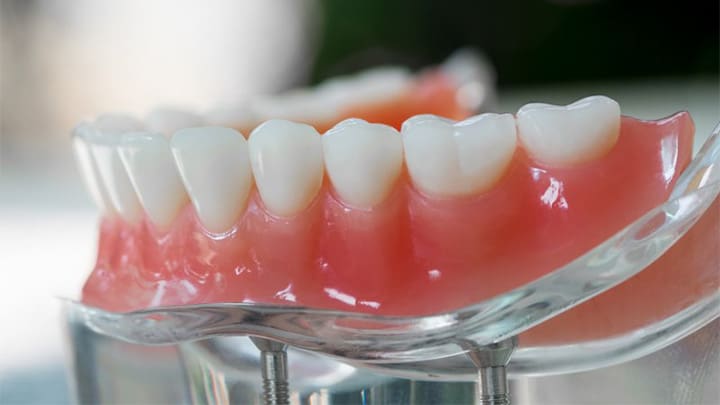Cost-Effective Tooth Replacement
Popularly known as “false teeth,” dentures are a form of dental prosthesis used in cases where a person is missing one or more of their teeth. Getting fitted with the denture normally helps people with their speech and eating. The right dentures in Northampton can also greatly improve your self-confidence.
Why Choose Northampton Dental Specialists Group For Dentures?
- Dentists With Over 25 Years Of Experience
- Dental Sedation Available For Comfort
- Natural-Looking Materials
Who's a Good Candidate for Dentures?

Most patients missing several or more teeth are good candidates for dentures. We’ll thoroughly examine your mouth to check on your oral health, and if there is a condition that could complicate your treatment, we can take care of it before you can receive your customized appliance. From there, we can customize a full or partial prosthetic to suit your needs! Here’s a quick guide to the qualities that make for a good denture candidate, but please contact our office if you’d like to know more.
Effects of Missing Teeth

The American College of Prosthodontists reports that the most common causes of tooth loss are enamel decay, gum disease, and oral injuries such as those resulting from blows to the face or falls. The loss of one or more teeth can lead to a wide range of oral and overall health issues such as gum injuries, dental drift, indigestion, malnutrition, further tooth loss, difficulty speaking, and diminished self-esteem.
What Qualifies You for Dentures?

Dentures can be an excellent solution for virtually everyone who has experienced significant tooth loss, lives with severe dental sensitivity, or whose teeth are extensively decayed as long as they have healthy gums and jawbones. If your mouth isn’t ready for dentures yet, you may be able to become an excellent candidate after receiving restorative treatments like gum disease therapy at our Northampton office.
The right type of denture for you depends on the number of teeth you are missing. A few or many teeth missing throughout the mouth may be addressed best with partial dentures, but the loss of an entire dental arch usually requires the placement of a full denture. Traditional dentures can be a cost-effective treatment for patients on a budget, but implant dentures enjoy superior longevity and exert maximum chewing power.
Alternative Tooth-Replacement Options
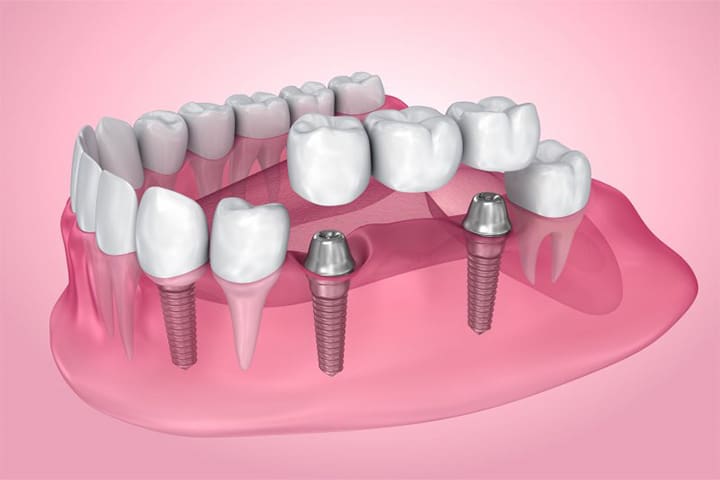
Patients who aren’t suitable candidates for dentures may be able to replace their teeth with other prosthetic devices. We offer:
- Dental bridges: These devices consist of a line of one or more artificial teeth supported by two dental crowns placed on healthy teeth or two dental implants inserted into the jawbone. Unless they are supported by implants, placing these devices requires the permanent alteration of the healthy teeth on either side of the gap.
- Dental implants: These appliances are titanium posts surgically inserted into the jawbone and fused with its structure through the natural process of osseointegration, and they can support lifelike restorations that deliver superior chewing power. While implants are more costly than traditional dentures, they can last much longer.
Types of Dentures

There are three main types of dentures: partial, full, and implant dentures. Each has a unique function to serve unique needs, and you can learn more about them with the information below.
Partial Dentures
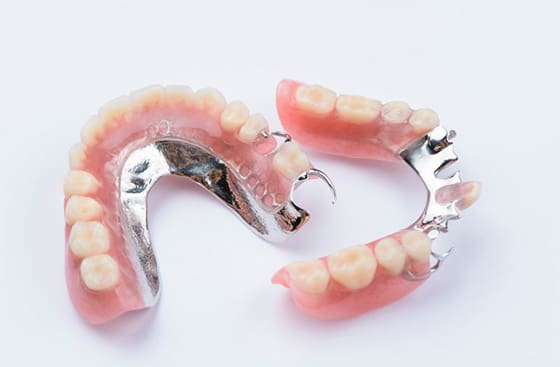
Partial dentures are useful for those who still have some of their natural teeth. They are individually crafted to fit around the remaining teeth, using clips. Both the “gum” base and artificial teeth can be colored to provide a good match with surrounding teeth and gum tissue.
Full Dentures
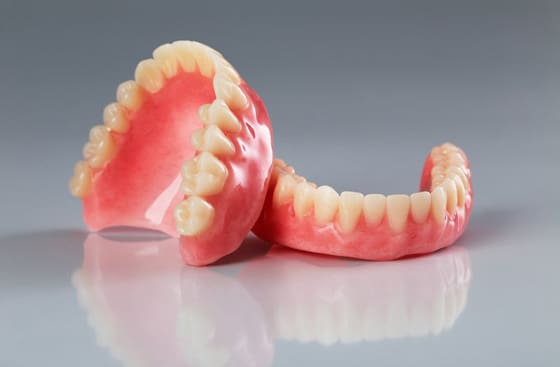
When you are missing all of your teeth, the type of dentures that you would be getting are known as full dentures. The artificial teeth used with the prosthetic are fitted to a plate that sits right over the gums. If it is an upper denture, it would rest on the roof of your mouth.
Dentures normally have a gum-colored acrylic base, although the inner part may be constructed from metal. But don’t worry – the base is distant from the teeth so that it is not visible when you open your mouth.
Implant Dentures
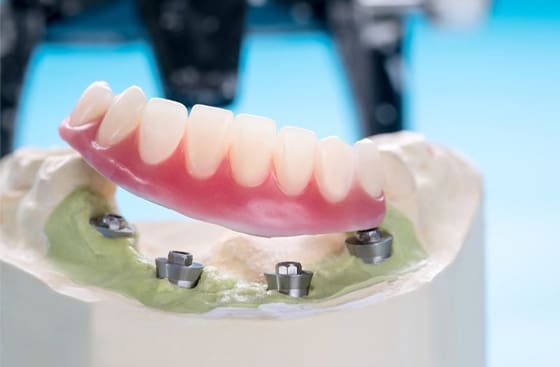
Dentures can be retained by dental implants, giving them all sorts of benefits, including improved stability, comfort, aesthetics, and a natural bite feel. Instead of allowing the denture to rest on your gums, we’ll secure them in place by strategically placing four or more dental implants and attaching them to the denture.
How Dentures Are Made
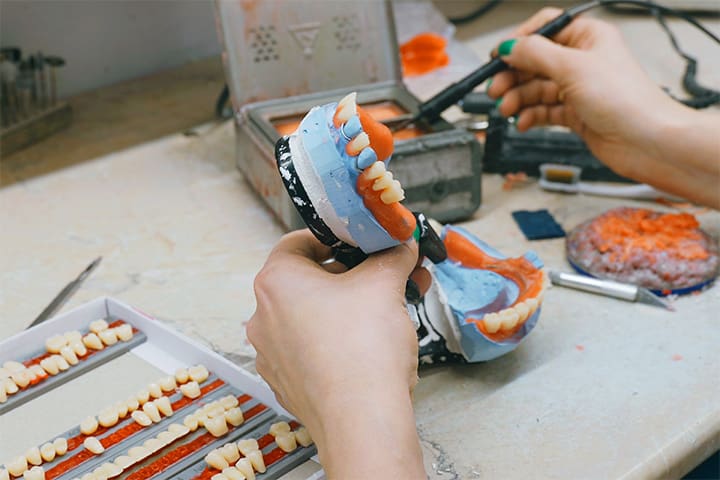
Northampton Dental Specialists Group creates one-of-a-kind dentures for each patient. Customized according to the measurements and specifications provided by our team, these uniquely designed prosthetics offer comfort and a natural appearance you can enjoy. But how are dentures made exactly? What does the process look like? Our team is making it easier for you to understand by providing additional details below.
What Are Dentures Made Of?
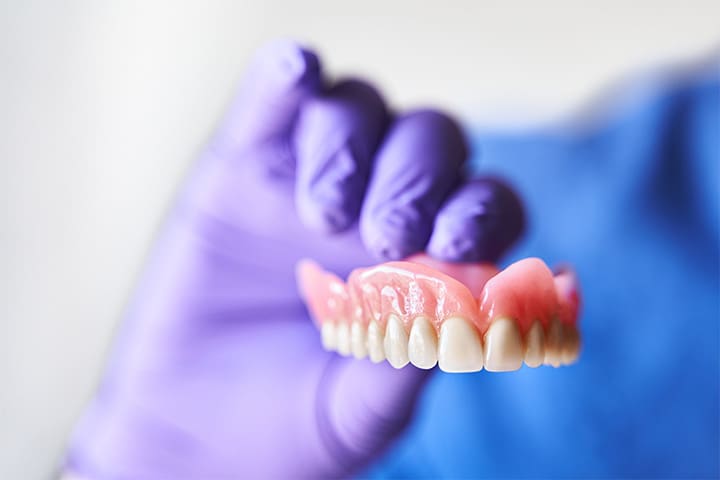
Each denture – partial or full – consists of two components: the base and artificial teeth.
- Denture Base: This portion of your denture is crafted most commonly from acrylic materials. Nylon and resin can also be used. As the supportive foundation of your new smile, the base holds the artificial teeth. It’s typically color-matched to the natural shade of your gums so that it appears lifelike once it is in place. If you receive a partial denture, the base will include a framework that makes it easy to attach to anchoring healthy teeth.
- Artificial Teeth: On top of your denture base are artificial teeth. Whether it is a partial or full prosthetic you need, we will determine the appropriate amount before attaching them to the base. These are usually made out of porcelain or resin, but most dentists opt for the former because of its natural-looking appearance.
The Denture Creation Process
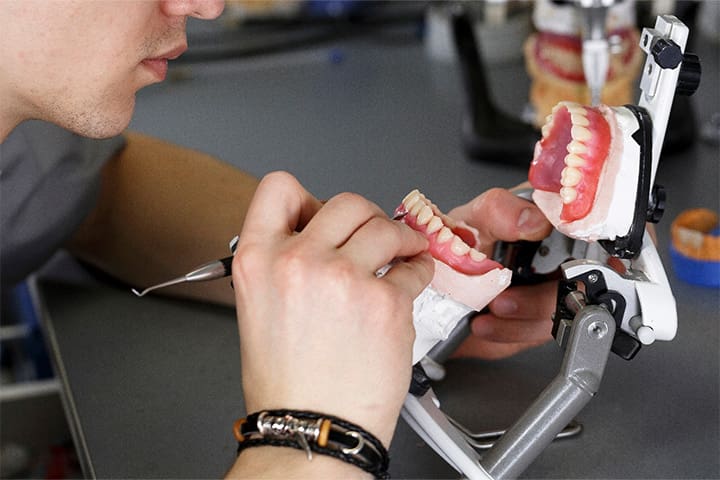
Creating your dentures requires several steps. After we take measurements of your jaw and impressions of your mouth, we will create a model that lab technicians can use to create your new smile. Once in their hands, they will craft a wax replica of your gumline before setting artificial teeth in place. An articulator is used for proper attachment so that additional adjustments can be made at this time.
We will receive the wax dentures in-house and have you come back in for a fitting. As long as everything looks good, we will send them back to the lab for completion. After placing the dentures in a flask and adding plaster, they are boiled so the wax will melt. The plaster helps hold their shape.
Next, we’ll make holes in the teeth and begin to inject the acrylic into the flask, as this will replace any wax. We’ll remove the dentures from the flask and place them in an ultrasonic bath, which is designed to remove excess plaster before we begin cutting away at additional acrylic.
After a final polish, they will be returned to our office for you to receive.
Adjusting to Your New Dentures

Adjusting to your dentures takes time. Your speech, eating habits, and comfort will improve after a short while, but in the meantime, it’s best to eat softer foods until you become more confident in your ability to chew. Also, speak slowly and practice reading aloud if you want to speed up how long the adjustment phase lasts. Finally, embrace the reality that you now have a lifelike, fully functional set of teeth – a fact that can help you overcome any fear you might have of sharing your new smile with the world.
At no point should you experience pain; however, some slight discomfort is normal. If you are unsure about anything you might experience after receiving your dentures, don’t hesitate to call our office.
The Benefits of Dentures

It’s not hard to see why dentures are such an incredibly popular way to address tooth loss. These remarkably functional and comfortable appliances provide a number of significant benefits that can considerably improve a patient’s oral and overall health as well as their day-to-day life. Here’s a brief guide to a few of the benefits dentures from Northampton Dental Specialists Group can provide, but please contact our office online if you would like to know more.
Psychological Benefits

Tooth loss can take a significant toll on your self-esteem and make it harder to smile proudly at gatherings with family and friends. This can lead to feelings of depression and isolation and leave you less willing to engage socially. Restoring lost teeth with lifelike dentures can allow a patient to feel more confident in their grin so they can smile more generously, which can help them maintain a cheery mood and a positive outlook.
Clearer Enunciation

Tooth loss alters the way air moves about the mouth during speech, and this can make it difficult to pronounce words clearly. Fortunately, dentures act in the place of the missing teeth during speech, and this can make it much easier to form words properly. You can expect to find speaking to be increasingly easy as you get more practice conversing while wearing your dentures.
Improves Nutrition

The loss of even a single tooth can make it more difficult to chew properly, and some people who are missing many teeth may give up on many nutritious foods entirely since they are too hard to eat. Since dentures restore a significant amount of your original chewing power, they can make it easier to enjoy a healthy diet that includes many interesting flavors and textures.
Preserves Oral Health

Tooth loss can leave the smile vulnerable to damage such as gum injuries and uneven dental wear as well as jawbone atrophy that leads to issues like dental drift, oral infections, and further tooth loss. Dentures can help support the remaining teeth so they can stay in healthy positions while protecting the gums and natural enamel from damage.
Expands Opportunities

Missing teeth can make it difficult to smile generously at business events, and this can make it hard to leave favorable first impressions that lead to new opportunities. Restoring your smile with dentures can make it much easier to win trust, build rapport, and close sales, and it may even lead to a promising new job or a lucrative promotion.
Understanding the Cost of Dentures

The cost of dentures is often why so many individuals choose them over other, more invasive solutions, like dental implants. Viewed as more affordable, the actual price tag for treatment varies from person to person. Our team must consider a few factors before establishing an estimate for you to review, but when we do, you can trust that we will go over how you can expect to pay, all while avoiding high out-of-pocket costs.
Factors That Affect the Cost of Dentures

During your initial consultation with one of our esteemed dentists, they will evaluate your smile and determine if you are a good candidate for dentures. If so, the following factors will help build a cost estimate that we will go over with you during your appointment:
- How many teeth are you missing?
- Do you need a full, partial, or implant denture?
- Do you need additional treatment to address another dental problem (i.e., gum disease, existing tooth decay, jawbone resorption, etc.)?
- What kind of materials will be used to craft your new teeth?
Are Implant Dentures More Expensive?
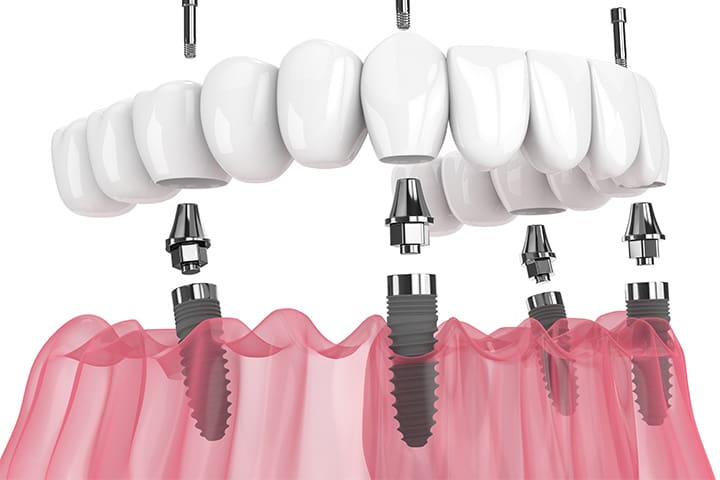
Implant dentures are more expensive than traditional prosthetics for a few reasons:
- They require surgical placement, so anesthesia is necessary
- They replace more than just the crowns of missing teeth; they also restore the roots
These two reasons are why millions choose to pursue permanent tooth replacement instead of traditional methods. While both deliver great results, implant dentures are built to last decades instead of years, so their longevity is a big selling point.
The added expense for these prosthetics is often considered worthwhile and more cost-effective because they don’t require relines or replacements, or denture adhesive, all of which can add up over time.
Does Dental Insurance Cover Dentures?

In most cases, yes, dental insurance will help cover a portion of your denture treatment. However, you should plan to review your policy or have a member of our team do it for you just to be sure. Each plan is different, so knowing what kind of coverage you have can eliminate potential surprises in the future. If your policy does include dentures as part of its qualifying services, your insurance company may pay up to 50% of the total cost.
Dentures Aftercare

Taking care of your dentures once they are firmly in place is the next step in the tooth replacement process. Now that you have a fully restored smile, you need to know what you must do to keep your new set of teeth looking their best and feeling comfortable in the long term. To help you get started, you are encouraged to review the following aftercare instructions and call us if you have any questions.
Removable Dentures
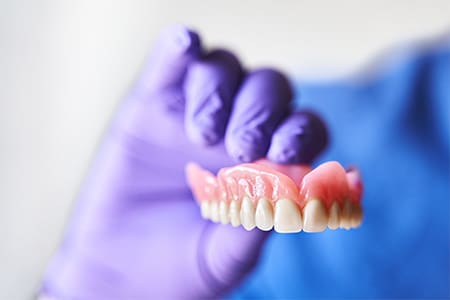
Traditional dentures – full and partial – are removable, which means you can take them out anytime you like. This makes them a flexible tooth replacement solution, one that you can clean thoroughly and benefit from their updated and more modern appearance.
Remove After Eating

After eating a meal, you need to take out your dentures to give them a thorough rinse. This removes built-up bacteria and food particles, lowering the chances they will transfer to your gums and begin causing problems. All that you need to do is use lukewarm water to rinse them off before reinserting them.
Clean Your Restoration
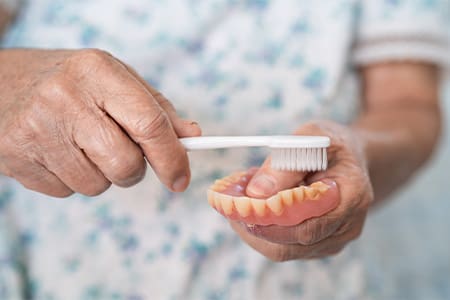
Apart from the two daily cleanings that should occur in the morning and at night, you also need to remember to rinse your teeth after eating. When preparing to clean your new smile, you’ll want to make sure to use a soft-bristle toothbrush, clear soap, and lukewarm water. While you can always buy a denture-specific brush, it is your decision. Just remember never to use hot water, as it will warp your dentures.
Keep Your Dentures Safe
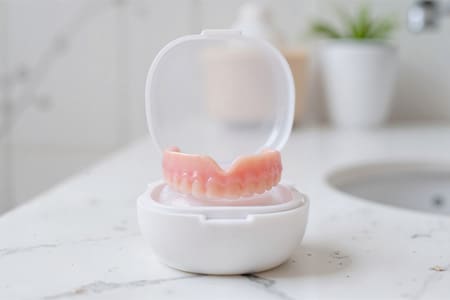
It’s too easy for tiny hands and furry paws to accidentally knock over your artificial teeth and lose them. Instead, place them within a protective case and high up on the counter. This will deter children and pets from becoming interested and potentially losing or damaging your dentures.
Remove Dentures When You Sleep
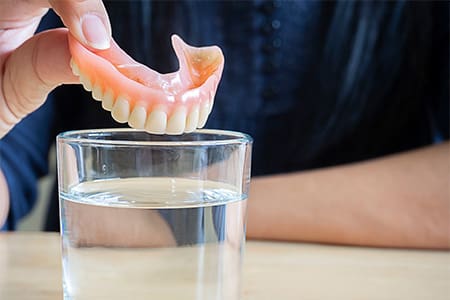
In the first 24 hours after receiving your dentures, you will need to wear them when you sleep. However, after this initial timeframe, it’s best if you remove them. Here are a few reasons why:
- Your gums and jawbone need to rest after supporting your new teeth all day.
- Bone resorption will likely occur while wearing dentures. If you sleep in them every night, this process will quicken, resulting in needing new dentures much sooner.
- There is an increased risk for pneumonia if you choose to wear your dentures while you sleep, as bacteria will build up in dark, moist areas (i.e., underneath the denture).
Notice Changes

As you continue to wear your dentures, you will need to have them relined or replaced eventually. This occurs when your jawbone shrinks and causes your artificial teeth to no longer fit as comfortably as before. By recognizing these issues right away, you can seek help from our team so that you don’t develop oral sores or additional discomfort.
Dentures FAQs
Can Dentures Become Ill-Fitting?
Initially, your dentures should fit well because they are custom-made for your specific mouth. As time passes, however, the bone in your jaw will deteriorate, changing the shape of your gums. Consequently, you may reach the point where your dentures no longer fit as well as they used to. This can lead to soreness, swelling of the gums, trouble speaking, and other issues.
If you suspect that your dentures no longer fit properly, we recommend that you call our office as soon as possible. Oftentimes, we may be able to reline or re-adjust your prosthesis; in other cases, it may be necessary to replace it altogether.
Can I Sleep with My Dentures?
Sleeping with your dentures is not recommended. Doing so can irritate your gums, and it can speed up the process of bone loss in your jaw. On top of that, wearing dentures while sleeping could raise your risk for pneumonia due to bacteria breeding in the dark, moist space underneath the prosthesis.
In short, it’s best to remove your dentures every night so that you can give your mouth a break while you sleep. Of course, you don’t want your dentures to dry out and lose their shape, so be sure to immerse them in a specialized denture-soaking solution before you head to bed.
Does It Hurt to Get Dentures?
Before you can receive dentures, you may need to have any remaining teeth extracted. Your mouth will be numbed for this procedure to prevent discomfort. However, you may experience some soreness during the recovery process. The discomfort should go away on its own after a few days, but you can manage it with an over-the-counter pain reliever such as ibuprofen.
As for the denture itself, it may cause a bit of irritation when you first start wearing it. This issue should eventually resolve itself once your mouth gets used to the prosthesis. Note that the adjustment period can potentially take months, but the exact length depends on the patient.
If your denture-related discomfort doesn’t seem to be getting any better over time, let our team know right away. We can double-check to make sure that your dentures fit as they should, and we can examine your mouth for any oral health issues that might require attention.
What Can’t You Eat with Dentures?
Certain kinds of foods can cause problems for denture-wearers. For example, peanut butter and other sticky foods can pull your prosthesis out of place, while overly hard foods like carrot sticks and apples could damage it. It’s therefore best to avoid these types of foods.
Additionally, trying to chew tough meats such as steak with dentures can be very uncomfortable. However, preparing such meats the right way can make them easier to handle. This means cooking them to make them more tender and cutting them into small, bite-sized pieces.


